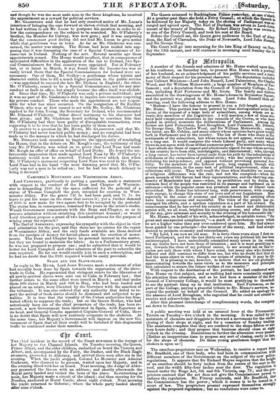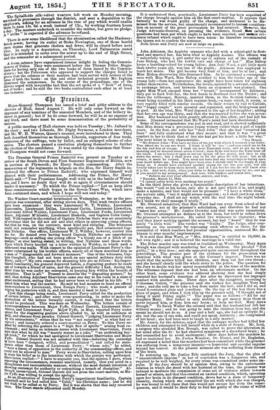Alltropgio.
A number of the friends and admirers of Mr. Hume waited upon bin, at his residence, on Saturday last, to present Mrs. Hume with a portrait of her husband, as an acknowledgment of his public services and a testi- mony of their respect for his personal character. The deputation included four Cabinet Ministers—Lord John Russell, Lord Palmerston, Sir Charles Wood, and Sir William Molesworth ; a large number of Members of Par. liament ; and a deputation from the Council of University College, Lon- don, including Earl Fortescue and Mr. Grote. The family and visitors assembled in the drawingroom of Mr. Hume's house in Bryanston Square' and the portrait was placed in the room. Lord John Russell then ad- vancing, read the following address to Mrs. Hume. "Madam—I have the honour to present to you a full-length portrait of Mr. Hume. This portrait has been painted by that distinguished artist Ms Lucas, at the request of a large body of subscribers, among whom are se. venty-five members of the Legislature. I will mention a few of those who have held conspicuous situations in the councils of the Crown, or who have guided in critical moments the deliberations of Parliament. Among the former are Lord Palmerston, Lord Broughton, Lord Panmure, Mr. Disraeli, Sir George Grey, Sir Charles Wood, and Sir William Molesworth; among the latter, are Mr. Cobden, and many others whose opinions have great weight both in Parliament and in the country. The list of those who share in the sentiments of the subscribers, but whose names do not appear, would indeed be a long one. It would comprise the whole Liberal party, and many whose views do not agree with those of that numerous party. The sentiments to which I here allude are those of respect and affectionate regard for one whose services to his country have been able, indefatigable, and,disinte.rested ; wbo, through a long career, has never been turned aside from his path by the calculations of selfishness or the animosities of political strife; who has supported without forfeiting his independence, and opposed without provoking personal hos- tility. To the members of the Liberal party, long engaged, though with various modifications, in the same task of political improvement, other re- collections will occur. They will recall the time when disability on account of religious differences was the rule, and not the exception—when the green mounds of Old Sarum had their representatives, and the thriving com- munity of Manchester had none—when, by prohibition and by duties, the common food of the people was restricted in its passage and burdened on its entrance—when the popular cause was prostrate and men of liberal views proscribed. Mr. Hume has laboured long, with perseverance, with courage, with energy, to change this state of our laws and of our Legislature. More especially in the cause of economy and retrenchment his untiring efforts have been conspicuous and successful. The voice of the people bas en- couraged his efforts, and a spotless reputation is a part of his reward. The consciousness that he has served his country as an honest and disinterested patriot will, we all trust, brighten his remaining course, and after the hest of the day, give calmness and serenity to the evening of his honourable life."
Mr. Hume, on behalf of his wife, acknowledged, in suitable terms, "the great and unexpected compliment,"--e mark of approbation upon which he seta higher value than any ever conferred upon him. He had always been guided by one principle—the interest of the many, and had always desired to promote economy and retrenchment-
" My Lord, I am now an old man. It is forty-three years since I first en- tered Parliament, and for the last thirty-six years my political life has bees uninterrupted. I have undoubtedly committed many errors .in its course, but my faults have not been those of intention ; and it is most gratifying to me, towards the close of my political career, to see around me on this 's- ession not only those with whom I have ado:3, 'nit many also who formerly differed and still continue to differ from me, but who no doubt feel that we had the same object in view, though our means of -attaining it may be dif- ferent. It is pleasing to me, however, to believe that we are all gradually approximating towards the same views as to the measures and principles best calculated to secure the future welfare of our country."
With respect to the destination of the portrait, he had conferred with Mrs. Hume on that subject, and as nothing had mom constantly engaged his attention than education, and as he had been a member of the lust Council of University College, it would be most gratifying to themboth to see the portrait hung up in that institution. Earl Fortescue, on the part of the College, paying a graceful tribute to Mr. Hume's services, so- cepted the portrait on behalf of the Council. He added an apology for the absence of Lord Brougham, who regretted that he could not attend to receive and acknowledge the gift.
After this pleasant interchange of complimentary words, the company sat down to luncheon.
A public meeting was held at an unusual hour at the Freemasons' Tavern on Tuesday—five o'clock in the morning. It was called by the assistants of chemists and druggists to forward a movement for the earlier closing of their shops at night, and for a cessation of Sunday trading. The assistants complain that they are confined to the shops fifteen or six- teen hours daily ; and they propose that business should close at eight o'clock in the evening. Resolutions to further the alteration were Passel [Rather an inopportune time to propose any sort of closing, early or late, for the shops of chemists. Do these young gentlemen forget that the cholera is upon us ?]
The omnibus-proprietors met on Wednesday, to receive a report from Mr. Bradfield, one of their body, who had been in communication with different members of the Government on the subject of the new pelic: regulations. It appears that Sir Richard Mayne requires that the height of an omnibus should be forty inches from the centre of the seat to roof, and the width fifty-four inches near the door. The regulation is issued under the Stage Act, 5th and 6th Victoria, cap. 79 ; and the pre. prietors contend that the act does not give the Commissioner power tn‘ enforce the regulation. Mr. Fitzroy contends, said Mr. Bradfield, that the Commissioner has the power ; which it seems is to be tested in .a court of law. The proprietors present expressed themselves strongly against the proposed-regulation ; but no resolutions were come to. The SpitsMelds silk-velvet weavers left work on Monday morning, marched in procession through the district, and sent a deputation to the employers, asking for an advance in the rate of pay which would enable them to earn 13s. 6d. a week instead of 12s., by working fourteen hours a da y. The masters undertook to consider the matter, but gave no pledge. A " strike " is expected if the advance be refused.
There is now some likelihood that the abomination called the Hackney- brook sewer, having its outlet at Stoke Newington, one of those horrid
A dozen cabmen have experienced intense delight in foiling the Commis- sioners of Police. They were summoned before the Thames Police Magis- trate for having only one of the two books of fares issued by the Commis- sioners; but the Policemen who appeared to support the charges failed to prove that the cabmen or their masters had been served with notices of the issue of both the books : on this and other technical grounds Mr. Ingham dismissed the summonses. In the course of the proceedings, one of the drivers urged with lawyerlike tact that the act spoke of a " book" of fares, not of books ; and' e said the two books contradicted each other in at least
one instance. open drains that generate cholera and fever, will be closed before next In reply to a deputation, on Thursday, Lord Palmerston stated that it is intended to cover over the sewer up to the end of High Street, and the remainder at a subsequent period.



























 Previous page
Previous page